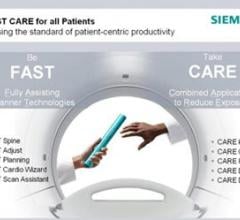These are some of the top cardiology technology news items from the spring and early summer 2011. As part of its efforts to expand integration of intravascular ultrasound (IVUS) image guidance with cath lab treatment devices, Volcano Corp. recently announced a supply agreement with ev3, a Covidien company. Volcano will supply its IVUS technology for use in ev3’s TurboHawk plaque excision (atherectomy) systems.
Computed tomography angiography (CTA) is one of the most complex procedures routinely performed on a CT scanner. A ...
July 15, 2011 — TeraRecon Inc. will highlight the accessibility and clinical workflow impact of its iNtuition solution at the sixth annual scientific meeting of the Society of Cardiovascular Computed Tomography (SCCT) at the Hyatt Regency Denver at Colorado Convention Center in Denver, Colo., July 14-17, 2011.
Providing exceptional cardiovascular care for patients to achieve the best possible outcomes is the number one goal for ...
Canada is spearheading an international study to determine if an implantable cardioverter defibrillator (ICD) can prevent death from serious heart rhythm problems in those patients who’ve survived a heart attack. Heart disease is a leading cause of death in Canada and the fastest growing disease worldwide.
July 15, 2011 — Attendees at the 2011 annual scientific meeting of the Society of Cardiovascular Computed Tomography (SCCT), July 14-17 at the Colorado Convention Center in Denver, will learn how Siemens Healthcare facilitates “Sustainable Cardiovascular Care” through its portfolio of products and services, including the Somatom Definition Flash CT scanner and <i>syngo</i>.via imaging software.
The National Aeronautics and Space Administration (NASA) selected GE Healthcare’s Vivid q cardiovascular ultrasound system for delivery to the International Space Station (ISS) on its final space shuttle flight. The Vivid q launched on the space shuttle Atlantis July 8.
Cardiac positron emission tomography (PET) is growing in popularity among cardiologists because it provides the ability ...
July 15, 2011 — In a true hybrid suite, both cath lab and open surgical procedures are performed in a single room. In creating hybrid cath labs, healthcare facilities require imaging technologies that provide the flexibility to quickly and easily access both the patient and ancillary equipment. Arnold Palmer Hospital for Children in Orlando, Fla., a leading children’s hospital, recently installed Toshiba America Medical Systems Inc.’s Infinix CF-i bi-plane system with the CAT-880B hybrid catheterization table for its new dedicated hybrid suite. When combining the five-axis positioner of the Infinix-i system with the tilting and cradling features of the hybrid table, physicians are able to obtain optimal image angles while having unprecedented patient access.

Carotid stenting is a more complex and challenging procedure than coronaries or peripheral vessels. Carotid stenting experts have the following advice for hospitals and physicians that want to enter this market.

In a move that will likely have a significant impact on how many patients are treated for carotid artery disease, the U.S. Food and Drug Administration (FDA) in May cleared the use of a stent to treat standard-risk surgical patients. Prior to this approval, carotid stenting was only indicated for use in high-risk surgical patients who were often denied the standard-of-care of carotid endarterectomy surgery. The decision to expand the indication for the Abbott RX Acculink carotid stent system is expected to have a major impact, offering patients the option of minimally invasive stenting rather than open surgery, which often leaves scars on the patient’s neck.
When performing radiofrequency (RF) ablation to treat cardiac arrhythmia, medical professionals must balance the safety ...
July 14, 2011 – Cambridge Heart Inc., a developer of non-invasive diagnostic tests for cardiac disease, announced that it has reached an agreement with its original equipment manufacturing (OEM) partner, Cardiac Science Corporation, to include Cambridge Heart’s proprietary microvolt T-wave alternans (MTWA) module on every new Q-Stress system sale beginning July 11, 2011. The company expects this initiative to significantly increase the placement of MTWA modules in coming quarters, which Cambridge Heart anticipates will provide the basis for future recurring revenue.
July 14, 2011 — Boston Scientific Corporation has completed patient enrollment in the ASTI post-market clinical follow-up study evaluating its Adapt Monorail carotid stent system in combination with its FilterWire EZ embolic protection system for treatment of carotid artery disease in patients at high risk for carotid surgery.
July 14, 2011 – Endosense, a Swiss medical technology company, has announced completion of the first patient case utilizing prototype software that integrates the contact-force data provided by Endosense’s TactiCath force-sensing ablation catheter with Siemens Healthcare’s electrophysiology solutions.
Change Healthcare Cardiology Hemodynamics is an integrated hemodynamic monitoring system for monitoring vital signs and ...
July 14, 2011 — The U.S. Food and Drug Administration (FDA) has conditionally approved the protocol for SYMPLICITY HTN-3, the U.S. clinical trial of renal denervation with the Symplicity catheter system for the treatment of resistant hypertension (high blood pressure in the presence of three or more medications). Patient enrollment in the landmark study is expected to start soon.
July 13, 2011 – InfraReDx Inc. announced enrollment of the first patient in its Phase 2 clinical trial, CANARY (Coronary Assessment by Near-infrared [NIR] of Atherosclerotic Rupture-prone Yellow). CANARY is designed to test the hypothesis that NIR-guided use of an embolic protection device (EPD), or filter, during percutaneous coronary intervention (PCI) can reduce the rate of peri-procedural heart attacks in patients identified as having high-risk lipid core plaques (HR-LCPs). InfraReDx’s LipiScan IVUS System is the only multimodality coronary imaging device approved in both the United States and Europe. It is in routine clinical use to detect the LCPs known to complicate stenting and suspected to cause most heart attacks.
July 13, 2011 – Many children and teens suffering from tachycardia, or rapid heart rate, have relied on medication to regulate their heart rhythms and control symptoms such as fatigue, dizziness and fainting spells. However, doctors at the Akron Children's Hospital Arrhythmia Center have made great strides in curing tachycardia with minimally invasive procedures.

 July 15, 2011
July 15, 2011











